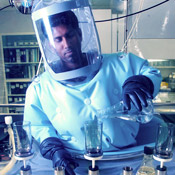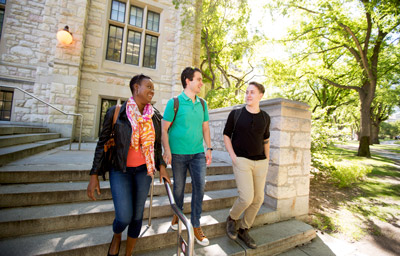About
Pharmacy encompasses the art and science of preparing and distributing medications, along with providing essential drug and health information to the public. Pharmacists play a pivotal role in healthcare teams, collaborating with patients to assess their medication requirements and ensure optimal care to meet these needs effectively.
- Four-year degree
This does not include the 2 years of university-level studies required prior to admission to the program.
- Full-time program
- You cannot begin this program directly from high school
What you will learn
You will explore the process of discovering new drugs, investigate the reasons for varying individual reactions to medications, understand drug mechanisms within the body, and examine the factors influencing their effectiveness and safety. Additionally, you'll acquire skills in filling medical prescriptions, educating patients about their medications, addressing diverse inquiries, and offering non-prescription health information encompassing diet, exercise, and other wellness aspects.
Curriculum
The Course and Program Catalogue has the complete and official listing of required classes and their descriptions for this program.
Why study here?

Experiential education
Through forty weeks of practice experiences, you will have the opportunity to cultivate your technical, professional, and patient care skills. These experiences will take place in various settings, including community pharmacies, hospital environments, and specialty practice sites such as research labs, clinical psychiatry practices, or medication assessment centres.

Facilities
At the Apotex Pharmacy Professional Practice Centre, we prioritize patient-focused and professional skills training. Our cutting-edge skills and simulation laboratory offers state-of-the-art facilities for hands-on learning. Moreover, our centre encourages seamless collaboration among students, faculty, and researchers across various health science disciplines, fostering a dynamic and enriching environment.

Opportunities to get involved
The college offers a Pre-Pharmacy Club for students interested in the profession of pharmacy. Learn about the Pharm.D. program from current students, instructors, and pharmacists.
Pharmacy and nutrition students are among the most active students on campus and in the community. The Saskatchewan Pharmacy and Nutrition Students' Society organizes a wide range of social, athletic and professional events, which include: welcome barbeque, action/sports nights, beach volleyball tournament, Christmas Formal, Professional Enhancement Days, kids medicine education program and Pharmacy Awareness Month activities.
Careers
To practise pharmacy, you need:
- a degree in pharmacy which includes experiential education (included in our program)
- successful completion of Pharmacy Examining Board of Canada Exam
- registration with a provincial regulatory body.
Our nationally accredited Pharm.D. program is designed to prepare graduates for a wide range of careers as pharmacists:
Community pharmacies
Pharmacists own, manage or are employed in pharmacies, where they provide pharmaceutical care to patients, including preparing and dispensing medications and answering questions about drugs.
Hospitals and medical centres
Pharmacists provide pharmaceutical care to patients and drug information services to other health-care practitioners. They can specialize in fields such as oncology, infectious disease, psychiatry and other areas.
Pharmaceutical industry
Pharmacists are involved in research, development of drug information materials and sales of pharmaceutical products. Advanced studies may be needed for some careers in industry
Universities
Pharmacy professors educate future professionals and conduct research. Advanced studies are needed for this career path.
Federal and provincial agencies
Pharmacists develop policy related to drugs and deal with laws to protect the public with respect to drug products and pharmacy practices.
Canada student loan forgiveness
As of Dec. 31, 2025, pharmacists working in rural areas and populations centres with fewer than 30,000 residents can apply for loan forgiveness—up to $60,000 over five years—toward their federal student loan balance. Learn about the eligibility requirements and application process.
Tuition estimates
| Year 1 - Canadian students | Year 1 - international students | Years 2, 3 and 4 - all students | |
|---|---|---|---|
| Tuition | $24,145 | $72,435 | $21,518 |
| Student fees | $1,308.24 | $1,308.24 | $1,308.24 |
| Books | $2,000 | $2,000 | $2,000 |
| Total | $27,453.24 | $75,743.24 | $24,826.24 |
Student fees are used to fund specific student benefits, including health, vision and dental coverage, a bus pass, recreational programs and fitness centre access.
The cost of books and supplies varies widely depending on the courses you are in. It is recommended that you budget for at least $2,000 per year.
Tuition rates (Canadian dollar) are effective for 2025-2026 and are subject to change.
Preparing for Pharmacy
High school requirements
There are no specific high school requirements for the Pharm.D. program. However, the following high school courses are often required for university-level pharmacy courses:
- Grade 12 level mathematics
- Grade 12 level biology
- Grade 12 level chemistry
- Grade 12 level physics (recommended)
Work experience
Related work experience is not a criteria for admission, although such experience may help you in answering some of the questions on the Personal Interview as well as you give you an idea if pharmacy is right for you.
University requirements
Must complete 60 credit units of required pre-pharmacy courses (see below) prior to April 30 of the year admission is desired. Read through the admission requirements below.
Enrolment is limited and, therefore, it is not possible to admit all qualified applicants.
Because the number of applicants far exceeds the number of available places, the College strongly recommends that prospective applicants take a program of study which will not only meet the requirements for entry to the Pharm.D. program, but will make them eligible for completion of an alternative program.
Admission requirements
New Conditional Acceptance for fall 2026 admission - effective May 1, 2025
- Application goes live Sept. 4, 2025
- Application deadline: January 15
- Preliminary transcript(s) due February 1
- Casper test dates scheduled between July and January
- Personal video interview invitations sent out late January
- Deadline for completing the personal video interview: March 31, 2026.
- Conditional offers sent out end of April
- Final transcript deadline: June 1
- Offers will be confirmed once a decision is rendered by the Admissions Committee in early June
- Candidates accepting a final offer of admission will be required to submit a tuition deposit to secure their spot in the program
Any questions can be directed to pn-admissions@usask.ca.
The application deadline for the PharmD and Bachelor of Science in Nutrition programs has been extended to March 15, 2026.
- Casper test dates taken between July 2025 and March 5, 2026, will be accepted
- Personal video interview deadline: March 31, 2026, at 4 p.m. CST
1. Required pre-pharmacy courses
Completion time
- Applicants must have completed 60 credit units (or equivalent) by April 30 of the year admission is desired.
- The coursework must include 24 credit units taken in at least one academic year (September to April).
- Prerequisite courses completed more than 10 years ago are not normally considered for credit as part of the admission application and will need to be repeated. As each situation is unique, students can request a review by contacting the college directly.
The following courses (or equivalent) are required in the 60 credit units:
| Course subject | Credit units (cu) required ** | At USask |
| Biology | 6 cu | Biology 120.3 and 121.3 |
| General chemistry | 3 cu | Chemistry 112.3 |
| Organic chemistry | 6 cu | Chemistry 250.3 and CHEM 255.3 |
| English* | 6 cu | Two of ENG 111.3, 112.3, 113.3, 114.3 or ENG 110.6 |
| Biochemistry 3 cu Biomolecules & 3 cu Metabolism |
6 cu | BMSC 200.3 and BMSC 230.3 |
| Physiology human body systems |
6 cu | BMSC 207.3 and BMSC 208.3 (former PHSI 208.6)*** |
| Mathematics (Calculus) | 3 cu | MATH 125.3 or MATH 104.3**** |
| Statistics | 3 cu | STAT 246.3 |
| Microbiology | 3 cu | BMSC 210.3 |
| Nutrition | 3 cu | NUTR 120.3 |
| Electives | 15 cu | 6 credit units from psychology, sociology, Indigenous studies, or philosophy; and 9 credit units any electives |
| Total credit units |
60 cu |
* The requirement for “English” must include English Literature and Composition. A general “academic writing” course is not sufficient.
** A “6 credit unit” course at USask is generally a course which includes three lecture hours weekly for a full academic year (approximately 26 weeks); a “3 credit unit” course is one which involves three lecture hours weekly for one term (semester, approximately 13 weeks). Such courses may also include additional laboratory or tutorial components.
*** BIOL/BMSC 224 and the upper level classes of PHPY 301, PHPY 302, and PHPY 303 will have met the prerequisite requirement equivalent to PHSI 208.6 or BMSC 207.3 and 208.3 for the purpose of admission to Pharmacy, upon completion of an undergraduate degree in Physiology and Pharmacology.
**** Effective September 2020 only. MATH 104 taken prior to 2019 is NOT considered equivalent to MATH 125.3.
Course equivalencies for courses taken at other institutions
Refer to course equivalencies chart for a listing of courses at many universities/colleges that are considered acceptable equivalencies. You can submit to Diane Favreau a detailed course outline (not calendar description) for evaluation for courses not listed on the chart or any questions for any other concerns about equivalency of courses taken at other institutions.
2. Academic requirements
- Applicants must have a minimum average of 70% to be considered for admission
How average is calculated:
- Average is calculated using all post-secondary (college, university and technical schools) courses taken by the applicant including failures but excluding graduate-level courses.
- average is based on the 60 credit units of required subjects [weighted as 60% of the admission average] and the cumulative average obtained on all courses at the university level [weighted as 40% of the admission average]
- grades from post-secondary institutions which use grading systems other than a percentage system are converted to percentages using established criteria
- if courses are repeated, they are treated as follows: in the calculation of the “prerequisite component” of the admission average, the higher of the two grades is used, unless the original grade was greater then 60%, in which case an “average” of the two grades is used. In the calculation of the “cumulative average component” of the admission average, an average of the two grades is used. The College does not encourage applicants to repeat courses unless a failing grade has been obtained.
NOTE: Courses that were issued a "pass" (P) or "credit" (CR) due to the pandemic will not be included in calculation of the applicant's Grade Point Average.
We encourage where possible for students to elect to have a numeric grade entered for required courses instead of P or CR.
For required courses a P or CR will be considered to have met that admission requirement.
3. Test of Critical Skills
- For the 2026 admission cycle, the College of Pharmacy and Nutrition is continuing with an online test of critical skills (Casper).
- It is an online situational judgement test used to assess non-academic competencies of applicants.
- Situational judgement tests present hypothetical scenarios, and ask students what they would do in a particular dilemma, or context, and attempt to assess how an individual will behave in a certain situation. The test assesses for communication, collaboration, equity, professionalism, problem solving, empathy, motivation, and ethics. There are no wrong answers.
- The test costs students $50 to take, and they must set up their test at least three days in advance. Students are also charged $18 for each school where they wish their results sent. Students take the test on a specific date, at a specific time, to ensure test security.
- Additional information on this new test of critical skills, including the posted 2024 test dates, are located on the College website – click the link below.
4. Personal Video Interview
There will be no face to face interviews. Once you have applied and paid the application fee, you will receive instructions for accessing the video interview process. If you do not receive instructions for accessing the video interview process by late January, please contact our office at (306) 966-6368 or by email at pn-admissions@usask.ca.
The video interview must be conducted between late-January and March 31, 2026. An internet-connected computer with a functioning webcam and microphone or smart phone is required.
To prepare for the Personal Video Interview, the college encourages all applicants to investigate the profession of pharmacy. Although the specific focus of the individual interview questions may shift from year to year, you should be prepared to discuss why you have selected nutrition as your choice of health care profession, your exposure to the profession, and how you perceive the role of the pharmacist.
Direct pharmacy experience is not a specific admission requirement, but if you have gained such exposure you may be better prepared to respond to at least one of the questions in the interview. If you are unable to gain work or volunteer experience directly related to the profession you should explore other options which would help enhance your knowledge of the profession. You should also reflect upon your previous life/work experiences and how ‘transferable’ they are to those attributes expected of a student in a health care profession.
5. English language proficiency
Applicants whose primary language is not English must present evidence of proficiency in English.
Selection
Selection criteria
Ranking for admission is based upon academic performance and personal qualities.
- Academic Record — 60% weighting
- Test of Critical Skills — 30% weighting
- Personal Video Interview —10% weighting
Because there are three components to the admission score, it is important for applicants to perform as well as possible on all three components. There is no average which will guarantee admission. It is possible that an applicant with a high average (e.g. 80%) will fail to gain admission because of a poor performance on the Test of Critical Skills or Video Interview. Conversely, applicants with lower academic standing sometimes achieve a high non-academic assessment which can raise the overall admission score. In the final selections, only applicants who meet minimum standards in each component (e.g. in the admission average and in the non-academic assessment) and whose overall “admission score” is high (relative to the other applicants) will be offered admission.
Because of the large numbers of highly qualified applications we receive, most individuals offered admission have had averages well above 75%.
Categories of applicants
Enrolment quota - There are 90 first-year seats in the Doctor of Pharmacy (Pharm.D.) program.
Saskatchewan residents include individuals who have lived and worked full-time in Saskatchewan for at least 12 consecutive months prior to the admission deadline without being a full-time student.
To qualify, you must pay income taxes in Saskatchewan and have a Saskatchewan health card for the year prior to the admission deadline. You cannot qualify for residency by attending school if your home is elsewhere. Applicants from border communities (e.g., Lloydminster, AB or Flin Flon, MB) are considered Saskatchewan residents for the purpose of their admission application to Pharmacy or Nutrition.
The University of Saskatchewan (USask) is committed to equity, diversity and inclusion, and proud to support academic opportunities for Indigenous students. We continue to grow our partnerships with Indigenous communities across the province, nationally and internationally and value the unique perspective that Indigenous students provide to strengthen these relationships. Verification of Indigenous membership/citizenship at USask is led and determined by the deybwewin | taapwaywin | tapewin: Indigenous Truth policy and Standing Committee in accordance with the processes developed to enact the policy.
Up to 15% of seats in this program are designated for Indigenous Saskatchewan residents who verified Indigenous membership/citizenship and verification of Indigenous membership/citizenship with documentation is required if you wish to be considered for one of these seats.
Please visit the Indigenous Membership/Citizenship Verification channel in PAWS and proceed through the verification system.
You can learn more about learn more about deybwewin | taapwaywin | tapwewin at indigenous.usask.ca. If you have any questions or require additional information about deybwewin | taapwaywin | tapwewin please contact: indigenoustruthpolicy@usask.ca.
Up to 9 of the 90 positions may be non-residents of Saskatchewan (including both out-of-province and international students).
One Saskatchewan student may be admitted under special circumstances or for compassionate reasons. Any Saskatchewan resident can apply in this category if they feel there are circumstances which merit special consideration. For example, if someone has had a health problem or some personal circumstance which has impacted their academic average in a pre-year, they should write a letter documenting the situation. Additional supporting documentation must also be submitted (e.g. medical information, funeral notices, etc.). Applications which are not considered in the special consideration category are automatically considered in the Saskatchewan resident pool. Applicants applying under this category are considered on a case-by-case basis. This position may not be filled every year.
Applying
Applications open: Sept. 4, 2025
Application deadline: Mar 15, 2026 at 11:59 pm CST
If you are currently enrolled in university courses, you are encouraged to apply AFTER receiving first term grades in January, when you know your academic average will meet the minimum requirement.
Late applications are not considered under any circumstances.
Items required to complete application
- Online application and non-refundable $125 CAD application fee deadline: Mar. 15, 2026
- Verification of Indigenous membership/citizenship in accordance with the processes developed to enact the deybwewin | taapwaywin | tapewin: Indigenous Truth policy (if required): Jan. 15, 2026
- Personal Video Interview: between end of January to March 31, 2026
- Test of Critical Skills: See College website for specific Casper test dates
- Transcripts: June 1, 2026
- Must be sent directly from the issuing institution via postal mail or courier to:
Admissions, College of Pharmacy and Nutrition
2A20.1 Health Sciences Building
107 Wiggins Road
Saskatoon, SK S7N 5E5 - If the post-secondary institution allows official transcripts to be emailed, they can be sent directly to pn-admissions@usask.ca
- Must be sent directly from the issuing institution via postal mail or courier to:
- Proof of English Proficiency (if required): June 1, 2026
- Copy of Permanent Resident Card (if citizenship status is Permanent Resident): June 1, 2026
After you apply
The admission scores of applicants who have met the minimum standards for all admission criteria (as described above) are calculated as soon as all data is received. Because the last date for receipt of transcripts is June 1, the admission decisions cannot be completed until mid-June.
Letters to the individuals selected for admission will be sent via email in late June, offering positions in the first-year of classes, according to established quotas. Individuals will have approximately 7-10 days to respond to this offer.
You cannot defer entry to the program until the next year since the number of applicants far exceeds the number of available places, we are not able to reserve admission spaces for future years.
When we send you an offer of admission, we will also send information about the program of study (i.e., the classes to take in each year) and a copy of your individual program record. If you have been granted any credits for courses you have taken, this will be reflected on the record form.
Once you have accepted an offer of admissoin, you will receive registration information from the university, and you must register for all the courses in the first year (for both terms) by accessing the PAWS registration system online.
Spaces in required courses are guaranteed for all our first-year students. If you have already registered in some courses (e.g., in the College of Arts and Science) by the time you are offered admission to Pharmacy, you will be removed from those courses and switched into our college which will then allow you to register for your courses.
Effective fall 2025, applicants who accept admission into either the Doctor of Pharmacy (Pharm.D.) or Bachelor of Science in Nutrition program are required to provide a non-refundable deposit of $1,000 by the admission acceptance deadline. The $1,000 deposit will be applied to your tuition.
Candidates who withdraw their admission acceptance after providing the deposit will forfeit the deposit.
A certain number of the remaining qualified applicants are placed on waiting lists (usually approximately 20 applicants), and are also informed of their status by email in late June. If an applicant declines the offer of admission, the next person on the waiting list is contacted. Generally, the admission process is complete by late July, but occasionally the College has accepted students from the waiting lists right up to mid-September. Once quotas are filled, all remaining applicants on the waiting lists are so informed by email. The remaining qualified applicants who are not offered admission also receive an email in late June.
Applicants who are unsuccessful are notified as soon as possible. Applicants are told the reasons for their lack of success (e.g., failure to achieve the minimum admission average, incomplete transcripts, prerequisites not met and/or failure to meet the critical skills performance standard) but individual results on the Test of Critical Skills or the Personal Video Interview, and subsequent admission scores are not released.
Two waiting lists may be created for each program, one for Saskatchewan residents, and one for non-Saskatchewan residents. The numbers on the waiting lists vary each year, as does the number of individuals who are actually offered admission.
If you have completed the prerequisites for Pharmacy and/or Nutrition, you should choose an alternate degree program (e.g., B.Sc., B.A.) and take courses which will lead toward that degree. There is no guarantee that your application to Pharmacy or Nutrition will be successful on subsequent application(s) - we expect that competition for available entry positions will remain high. Therefore, you should NOT take courses at random, and you should not take courses that are included in our degree programs unless they are also needed for your alternate degree. To determine what courses you need to take to complete another degree, you should consult the appropriate college or department offices.
If you wish to continue at the university and wish to improve your academic average, you would be well advised to take courses in which you can do well. You should also think about developing or improving your skills in reading, writing and critical thinking, and to investigate the Pharmacy profession. No preference is given to applicants who have completed several years of study or to those who may already completed a degree(s). Each year you apply you are competing with new applicants and are ranked relative to the performance of the others.
It is not possible to get into Pharmacy by being admitted to Nutrition and then transferring to Pharmacy after one year (or vice versa).
You would have to reapply to enter Pharmacy and would have to meet all requirements, including completing the Test of Critical Skills and completing the Video Interview again. You would be competing against all others who are also interested in admission to Pharmacy in that year. Your grades in the first year of the current program would be included in the calculation of your admission average.
College info

The Doctor of Pharmacy (Pharm.D.) degree is offered by the University of Saskatchewan's College of Pharmacy and Nutrition.
Established as the School of Pharmacy in 1913, the College of Pharmacy and Nutrition now has a unique combination of two health disciples and professional programs, and serves as a model for integrating health promotion and education, health care delivery, interdisciplinary research, and community outreach and engagement.
Related programs
If you are looking for graduate level (master's or Ph.D.) programs please consult our graduate students' website.

Questions?
Phone: 306-966-6327
Email: pharmacy-nutrition@usask.ca
Health Sciences Bldg
107 Wiggins Rd
Saskatoon, SK S7N 5E5

